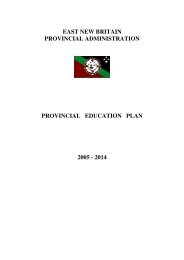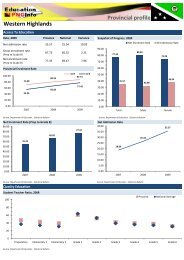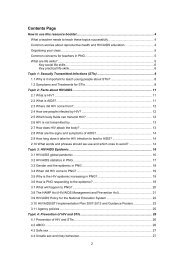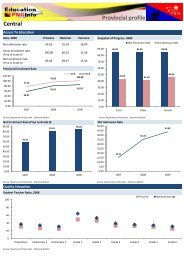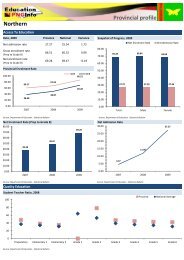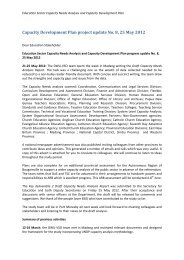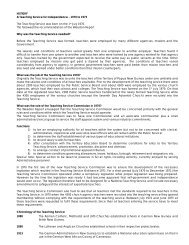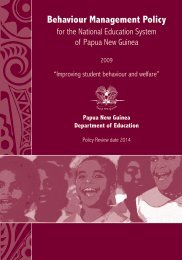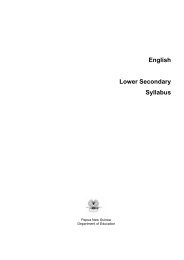Medium Term Development Plan, 2011-2015 - UNDP in Papua New ...
Medium Term Development Plan, 2011-2015 - UNDP in Papua New ...
Medium Term Development Plan, 2011-2015 - UNDP in Papua New ...
You also want an ePaper? Increase the reach of your titles
YUMPU automatically turns print PDFs into web optimized ePapers that Google loves.
3.5 Higher education<br />
Goal:<br />
To develop the higher skills needed for PNG’s prosperity with a world class tertiary<br />
education sector<br />
Introduction<br />
<strong>Papua</strong> <strong>New</strong> Gu<strong>in</strong>ea’s higher education <strong>in</strong>stitutions made significant contributions to nation build<strong>in</strong>g <strong>in</strong> the<br />
early years of PNG’s <strong>in</strong>dependence. The universities and colleges adequately met the extraord<strong>in</strong>ary demands<br />
that were placed on them dur<strong>in</strong>g this time, provid<strong>in</strong>g well educated leaders for public <strong>in</strong>stitutions and skilled<br />
personnel for other important spheres of society. They can do so aga<strong>in</strong> but, right now, the quantity and<br />
quality of graduates is far short of what is needed due to <strong>in</strong>adequate resources and a range of governance and<br />
general service quality issues. Major changes <strong>in</strong> the <strong>in</strong>stitutions of higher education are necessary if PNG is to<br />
be successful <strong>in</strong> meet<strong>in</strong>g the challenges set <strong>in</strong> the Vision 2050 and the PNGDSP 2010-2030. Over the next 20<br />
years, the Government aims to develop the higher skills needed for PNG’s prosperity with a world class<br />
tertiary education sector. Hav<strong>in</strong>g a national manpower plan <strong>in</strong> place to estimate the required number of<br />
personnel <strong>in</strong> technical and professional fields — such as medical doctors, nurses, teachers and eng<strong>in</strong>eers — is<br />
crucial to overcome the problem of uncoord<strong>in</strong>ated and fragmented provisions of higher education.<br />
MTDP <strong>2011</strong>-<strong>2015</strong><br />
In the next five years <strong>in</strong>stitutions of higher education will be mov<strong>in</strong>g down the path towards self-f<strong>in</strong>anc<strong>in</strong>g<br />
with the establishment of a Higher Education Endowment Fund. The Higher Education Endowment Fund<br />
Trust will become a major source of fund<strong>in</strong>g for new capital <strong>in</strong>vestment, ma<strong>in</strong>tenance of faculties, tw<strong>in</strong>n<strong>in</strong>g<br />
arrangements with foreign <strong>in</strong>stitutions, <strong>in</strong>dustrial partnership, course field work and a wide range of<br />
scholarships to meet the needs of both <strong>in</strong>dustry and the public service. The priority expenditure areas of the<br />
Fund will be clearly outl<strong>in</strong>ed and managed by the Commission for Higher Education, under the general<br />
supervision of the Department of National <strong>Plan</strong>n<strong>in</strong>g and Monitor<strong>in</strong>g. The Fund will be f<strong>in</strong>anced by<br />
contributions from the universities bus<strong>in</strong>ess’ arms, contributions from the private sector, revenue from a<br />
Higher Education Contribution Scheme (HECS), the 2 per cent tra<strong>in</strong><strong>in</strong>g levy, and assistance from development<br />
partners. The Government will provide support for the Fund dur<strong>in</strong>g the first MTDP while the HECS scheme is<br />
set up and until the HECS scheme generates sufficient revenues.<br />
The <strong>in</strong>troduction of a government-supported loans scheme to students <strong>in</strong> the form of HECS will enable higher<br />
education students to defer the cost of their studies. The HECS scheme will provide loans to cover tuition fees<br />
imposed by universities, accommodation, plus a specified maximum “<strong>in</strong>cidentals allowance”. Public fund<strong>in</strong>g<br />
for higher education will be realigned towards targeted tra<strong>in</strong><strong>in</strong>g scholarships. Together with other measures,<br />
the National Government will help prov<strong>in</strong>cial and district authorities to establish scholarship systems for their<br />
students.<br />
Before <strong>in</strong>vest<strong>in</strong>g <strong>in</strong> the expansion of universities and colleges, the Government will fund the recapitalisation of<br />
exist<strong>in</strong>g <strong>in</strong>stitutions and will also ensure they have the management capacity to oversee the expansion. The<br />
focus of government fund<strong>in</strong>g will therefore be on rais<strong>in</strong>g the quality of graduates. To this end, the Government<br />
will also support universities to improve <strong>in</strong>ternet access and communication technologies, and to forge strong<br />
partnerships with relevant stakeholders (both with<strong>in</strong> and outside PNG), <strong>in</strong>clud<strong>in</strong>g dialogue with PNG <strong>in</strong>dustry.<br />
The Government will ensure that all tra<strong>in</strong><strong>in</strong>g standards are aligned to the PNG National Qualification<br />
Framework by <strong>2015</strong>.<br />
Build<strong>in</strong>g on MTDP <strong>2011</strong>-<strong>2015</strong><br />
Under subsequent MTDPs, the expansion of universities, technical colleges, bus<strong>in</strong>ess colleges, polytechnic<br />
colleges, teachers’ colleges, nurs<strong>in</strong>g colleges and vocational tra<strong>in</strong><strong>in</strong>g <strong>in</strong>stitutions will be the focus of<br />
government priorities. Forg<strong>in</strong>g partnerships with relevant stakeholders and engag<strong>in</strong>g <strong>in</strong> tw<strong>in</strong>n<strong>in</strong>g<br />
arrangements with reputable <strong>in</strong>ternational <strong>in</strong>stitutions of higher education will also be encouraged and<br />
supported.<br />
Challenges <strong>in</strong> implementation<br />
The higher education sector <strong>in</strong> PNG has been faced with many challenges and difficulties relat<strong>in</strong>g to<br />
<strong>in</strong>sufficient f<strong>in</strong>anc<strong>in</strong>g of higher education <strong>in</strong>stitutions, quality and access to tertiary education, staff<br />
development, skills-based tra<strong>in</strong><strong>in</strong>g, enhancement and preservation of quality <strong>in</strong> teach<strong>in</strong>g, research and<br />
services, relevance of programs, employability of graduates, establishment of efficient co-operation<br />
agreements, and equitable access to the benefits of <strong>in</strong>ternational co-operation. External challenges <strong>in</strong>clude<br />
adequate provision of key utilities (water, sanitation, telecommunications, electrification and <strong>in</strong>formation and<br />
communication technology) for higher education <strong>in</strong>stitutions.<br />
38



